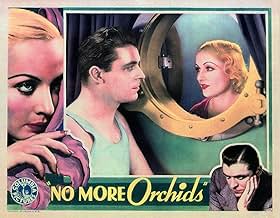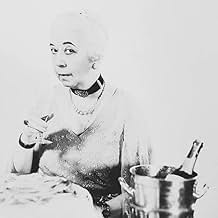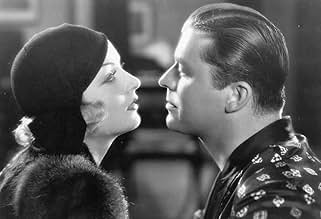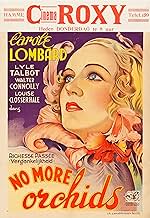Aggiungi una trama nella tua linguaAn heiress forced to marry into royalty in order to save her banker father falls in love with another man while on a cruise.An heiress forced to marry into royalty in order to save her banker father falls in love with another man while on a cruise.An heiress forced to marry into royalty in order to save her banker father falls in love with another man while on a cruise.
- Regia
- Sceneggiatura
- Star
Sidney Bracey
- Holmes
- (non citato nei titoli originali)
Belle Johnstone
- Housekeeper
- (non citato nei titoli originali)
Edward LeSaint
- Capt. Jeffries
- (non citato nei titoli originali)
Wilfred Lucas
- Banker
- (non citato nei titoli originali)
Charles Hill Mailes
- Merriwell
- (non citato nei titoli originali)
Harold Minjir
- Modiste
- (non citato nei titoli originali)
Broderick O'Farrell
- Benton -- Butler
- (non citato nei titoli originali)
William Worthington
- Cannon
- (non citato nei titoli originali)
Recensioni in evidenza
This is one of Carole Lombard's best early films. It goes a long way to sort of proving that it was Harry Cohn and Columbia Pictures, not the actress's home studio Paramount, that gave her the chance to shine most. The casting in this picture is flawless-- Lyle Talbot turns in a surprisingly good performance as the romantic interest and generates a lot of chemistry with Lombard; C. Aubrey Smith is letter-perfect in his villainous role as the tyrannical grandfather; and both Louise Closser Hale as the charming grandmother and Walter Connolly as the financially- troubled father give the story its heart and soul. Even the smaller roles (the catty rival, and the European prince) are filled by capable performers. But it's the story that captivates the viewer. An opposites-attract romance, it combines elements of comedy and melodrama, moves briskly and is very entertaining. For a product from a then-poverty row studio, this Columbia Pictures release is as sharp and polished as anything that came out of MGM or Paramount at this time. Highly recommended and worth seeing!
Rather schizophrenic comedy-drama from post-Prohibition but pre-Hays Code, meaning Carole Lombard gets to strut around in her flimsies, make prurient wisecracks, and be not the least timid about getting what she wants. She's a rich girl with a bumbling banker dad (Walter Connolly, playing virtually the same role as a year later in "It Happened One Night") and an aren't-I-adorable grandma (Louise Closser Hale, trying to be May Robson) who falls for unrich Lyle Talbot (a perfectly OK leading man, who looks a bit like the pre-mustachioed Gable, and has some of the Gable swagger). Why her awful grandpa would insist on her marrying somebody else isn't clear, nor is it clear why the sacrifice at the end makes everything all right. But ignore the plot and enjoy the ribald ripostes, and, especially, Carole looking gorgeous and wriggling around with great vivacity. She has star quality, but beyond that, she's a real actress, and you'll notice how carefully she's building and sustaining a not-always-likable character. Fine work.
No More Orchids (1932)
*** (out of 4)
Interesting, if a tad bit strange, drama about a rich brat (Carole Lombard) who falls in love with an average guy (Lyle Talbot) but her greedy grandfather (C. Aubrey Smith) forces her to marry a rich Prince so that her father will be saved from his debt. NO MORE ORCHIDS isn't a very well known film and even fans of Lombard seems to have never seen it. That's a shame because it turned out to be a pretty good gem even if the final ten-minutes are extremely bizarre and in the end they really don't work. The film benefits from a very strong screenplay as well as some strong performances. The actual story of this thing is the type of melodrama that had been going on throughout the silent era and would continue throughout the 30s as we have the bad girl falling for a good guy only to be forced into the arms of someone else. What makes it seem so fresh and original here is that the screenplay is smart enough to actually make for some nice dialogue scenes where everything plays out in a believable fashion. This includes several scenes of Lombard having to really think through her decision and this makes for some very good drama. The screenplay is smart enough to make her character more than just a single note and the viewer certainly benefits from this. Lombard does a very good job as she was perfectly capable of playing the brat side of this woman but we also believe her when the character slowly starts to change due to her feelings for Talbot. As for Talbot, he too turns in another winning performance as does Walter Connolly as the father and Louise Closser Hale nearly steals the film as the fast-talking grandma. Smith turns in his typical fine performance as well. Fans of pre-code will be happy to see some rather risky dialogue about Lombard not being a virgin and we even get a sequence where she takes her rob off and is standing around in her bra and panties. Not too shocking in today's age but this was 1932 after all. The film takes a rather obvious twist towards the end and I think what the father does, which I won't ruin, doesn't work at all. The screenplay tries to milk this sequence for everything it's worth but I felt it fell flat on its face and didn't pack the punch it was going for. Even so, NO MORE ORCHIDS is still a fine little film that deserves to be seen by more.
*** (out of 4)
Interesting, if a tad bit strange, drama about a rich brat (Carole Lombard) who falls in love with an average guy (Lyle Talbot) but her greedy grandfather (C. Aubrey Smith) forces her to marry a rich Prince so that her father will be saved from his debt. NO MORE ORCHIDS isn't a very well known film and even fans of Lombard seems to have never seen it. That's a shame because it turned out to be a pretty good gem even if the final ten-minutes are extremely bizarre and in the end they really don't work. The film benefits from a very strong screenplay as well as some strong performances. The actual story of this thing is the type of melodrama that had been going on throughout the silent era and would continue throughout the 30s as we have the bad girl falling for a good guy only to be forced into the arms of someone else. What makes it seem so fresh and original here is that the screenplay is smart enough to actually make for some nice dialogue scenes where everything plays out in a believable fashion. This includes several scenes of Lombard having to really think through her decision and this makes for some very good drama. The screenplay is smart enough to make her character more than just a single note and the viewer certainly benefits from this. Lombard does a very good job as she was perfectly capable of playing the brat side of this woman but we also believe her when the character slowly starts to change due to her feelings for Talbot. As for Talbot, he too turns in another winning performance as does Walter Connolly as the father and Louise Closser Hale nearly steals the film as the fast-talking grandma. Smith turns in his typical fine performance as well. Fans of pre-code will be happy to see some rather risky dialogue about Lombard not being a virgin and we even get a sequence where she takes her rob off and is standing around in her bra and panties. Not too shocking in today's age but this was 1932 after all. The film takes a rather obvious twist towards the end and I think what the father does, which I won't ruin, doesn't work at all. The screenplay tries to milk this sequence for everything it's worth but I felt it fell flat on its face and didn't pack the punch it was going for. Even so, NO MORE ORCHIDS is still a fine little film that deserves to be seen by more.
Grace Perkins, the author of this story also wrote MY PAST and NIGHT NURSE which were both big impact, big juicy dramas for Warner Bothers around this time as well. This picture has that same strong narrative, a well-crafted sense of direction and an empathy with the charismatic leads. The characters feel like real people, they work well together and develop together. When however you stand back and look at the family to which Carole Lombard's character belongs you have to admit that such a family could only ever exist in fiction, they are a little ridiculous but because they're acted so well with such authenticity, you've abandoned your sense of reality ages ago. One of the reasons it all seems so believable is because for the first half of the film it's a kind of light comedy and the way your mind accepts such something like that is less critical than if it were a tough drama. By the time the film switches from comedy to tragedy (or rather something a bit more dramatic) your mind is fully engaged; a common but still clever little trick.
In essence, it's about a rebellious young heiress (yes, another one!) who rather unsurprisingly falls for the wrong guy (yes, it is that predictable). That's how the film hooks you in, using a familiar story peppered with good witty writing and convincing performances. About half way through it starts to get down to business but still retains that lightness and humour - mainly down to the Granma (played by Louise Closer Hale) who is brilliant...... and so is Walter Connolly (was it in his contract that every father in every Columbia picture of the early 30s had to be played by him?) and so is Carole Lombard (genuinely funny and lovely without doing all that annoying screeching she did in her later films). They're all so good - they're 'proper actors!' And I know I left Lyle Talbot out of that list..... he's not a bad actor he's just incredibly dull. Why would someone as bubbly and vivacious as Carole Lombard's Annie fall for the dullest man in America?
In summary, this is a really worthwhile way to spend an hour and a half if you enjoy a better than average early thirties drama with a splash of comedy thrown in. It's made by Columbia which was not known for its extravagant production budgets but this one feels as classy as anything MGM might have made. It's not got a deep message, it isn't one of those a Warner Brothers/Zanuck movies that will make you angry and want to change the world but it's engaging and good fun.
In essence, it's about a rebellious young heiress (yes, another one!) who rather unsurprisingly falls for the wrong guy (yes, it is that predictable). That's how the film hooks you in, using a familiar story peppered with good witty writing and convincing performances. About half way through it starts to get down to business but still retains that lightness and humour - mainly down to the Granma (played by Louise Closer Hale) who is brilliant...... and so is Walter Connolly (was it in his contract that every father in every Columbia picture of the early 30s had to be played by him?) and so is Carole Lombard (genuinely funny and lovely without doing all that annoying screeching she did in her later films). They're all so good - they're 'proper actors!' And I know I left Lyle Talbot out of that list..... he's not a bad actor he's just incredibly dull. Why would someone as bubbly and vivacious as Carole Lombard's Annie fall for the dullest man in America?
In summary, this is a really worthwhile way to spend an hour and a half if you enjoy a better than average early thirties drama with a splash of comedy thrown in. It's made by Columbia which was not known for its extravagant production budgets but this one feels as classy as anything MGM might have made. It's not got a deep message, it isn't one of those a Warner Brothers/Zanuck movies that will make you angry and want to change the world but it's engaging and good fun.
Spoiled rich girl (Carole Lombard) falls in love with poor boy (Lyle Talbot). But her father's financial troubles may force her to marry a wealthy prince. Pre-Code soaper features a scene of Carole Lombard in her underwear, which is as good a selling point as any. Carole's good in this and, of course, beautiful. Talbot does okay. Nice supporting cast. Louise Closser Hale is great as Carole's grandmother, Walter Connolly her extremely likable father, and C. Aubrey Smith fine in a villainous role. Enjoyable enough. It's not a bad movie of its type. Helps if you're a big fan of Lombard. The ending seems silly on paper but was surprisingly effective.
Lo sapevi?
- QuizWalter Connolly (Bill Holt) and Jameson Thomas (Prince Carlos) would again play a father and his prospective son-in-law in Accadde una notte (1934).
- Blooper(at about 6 mins) When Anne Holt is told to take off her dress, she is clearly not wearing a bra. Two edits (six seconds) later, Anne is seemingly struggling to pull her dress below her hips while wearing a bra, which she would not have had time to put on while simultaneously removing her dress.
- ConnessioniReferences The Poor Little Rich Girl (1917)
I più visti
Accedi per valutare e creare un elenco di titoli salvati per ottenere consigli personalizzati
- How long is No More Orchids?Powered by Alexa
Dettagli
- Data di uscita
- Paese di origine
- Lingua
- Celebre anche come
- La consentida
- Luoghi delle riprese
- Wall Street, Manhattan, New York, New York, Stati Uniti(establishing shot for the Banker's Club scene)
- Azienda produttrice
- Vedi altri crediti dell’azienda su IMDbPro
- Tempo di esecuzione
- 1h 18min(78 min)
- Colore
- Proporzioni
- 1.37 : 1
Contribuisci a questa pagina
Suggerisci una modifica o aggiungi i contenuti mancanti







































